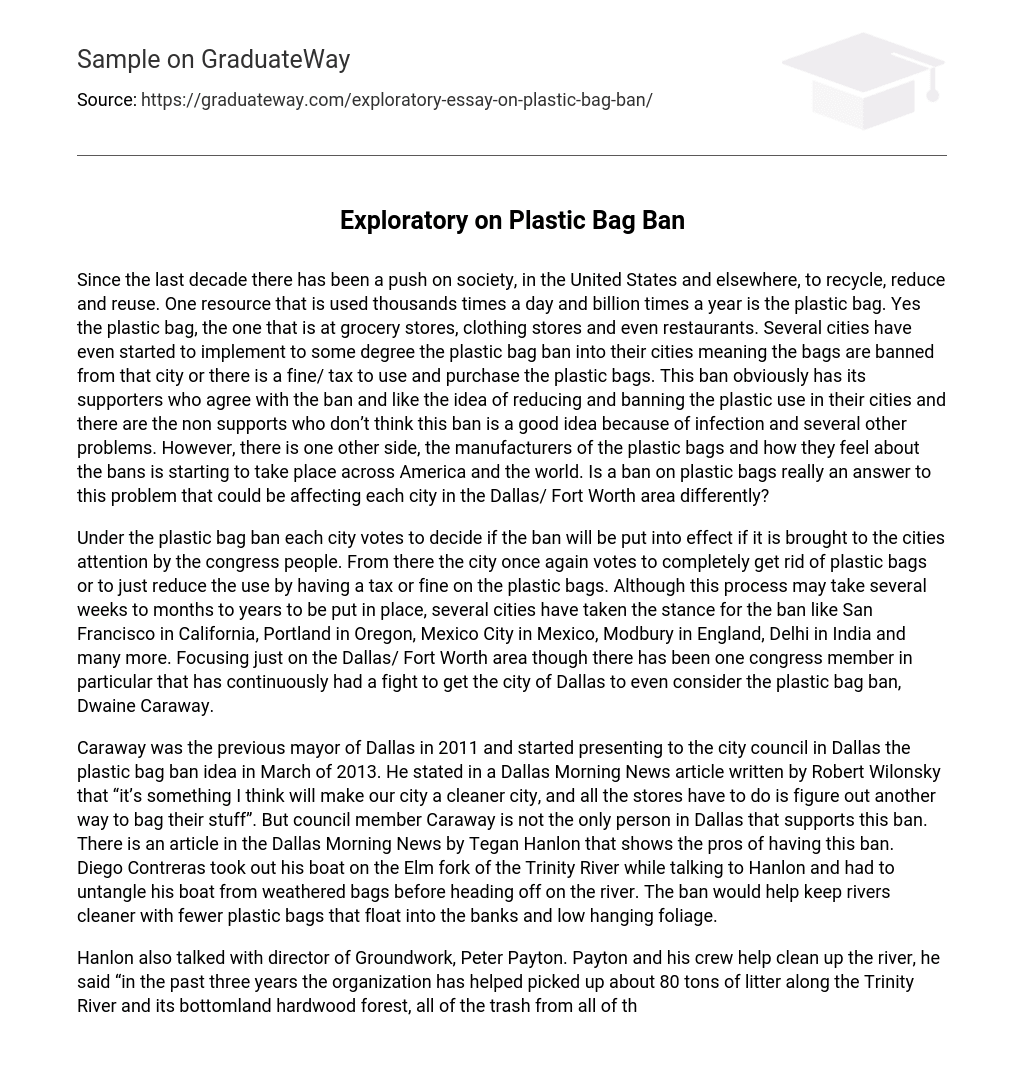In recent years, there has been a significant societal push towards recycling, reducing, and reusing. One item that contributes to this issue by being commonly used and disposed of is the plastic bag. Plastic bags can be found at grocery stores, clothing stores, and restaurants. Some cities have responded by implementing bans or fines/taxes on plastic bags in order to decrease plastic waste. Supporters argue that these bans can be effective in reducing plastic waste in cities, but opponents raise concerns about infection and related issues. It is important to also consider the perspective of plastic bag manufacturers and their stance on these bans. Ultimately, we need to question whether banning plastic bags truly solves this problem since its impact may vary across different cities in the Dallas/Fort Worth area.
Each city has the authority to vote on implementing a ban on plastic bags under regulations set by congress people. The process includes an initial vote to decide whether to completely eliminate plastic bags or reduce their use through taxes or fines. This implementation process can span from weeks, months, to even years. However, several cities such as San Francisco in California, Portland in Oregon, Mexico City in Mexico, Modbury in England, and Delhi in India have already enforced a ban on plastic bags. In the case of the Dallas/Fort Worth area, one dedicated congress member named Dwaine Caraway has been persistently advocating for Dallas to consider adopting a plastic bag ban.
Caraway, the former mayor of Dallas in 2011, presented the idea of a plastic bag ban to the city council in March of 2013. He believes that implementing this ban will make Dallas a cleaner city, stating, “it’s something I think will make our city a cleaner city, and all the stores have to do is figure out another way to bag their stuff,” in an article by Robert Wilonsky in the Dallas Morning News. However, Caraway is not the only supporter of this ban in Dallas. An article by Tegan Hanlon, also published in the Dallas Morning News, highlights the advantages of the ban. Hanlon spoke with Diego Contreras who experienced the inconvenience of weathered bags tangling his boat on the Elm fork of the Trinity River. Implementing the ban would help maintain cleaner rivers by reducing the number of plastic bags that end up in banks and vegetation along the river.
During a conversation with Peter Payton, the director of Groundwork, Hanlon learned about how his team helps clean up the river. Payton stated that in the past three years, their organization has collected around 80 tons of litter along the Trinity River and its bottomland hardwood forest. He emphasized that all of the trash from these individuals ends up right here. Despite having volunteers to assist them, Dallas’ Park and Recreation Department still allocates millions of dollars annually to improve the city’s appearance.
In another discussion with John Jenkins, Assistant Director of Dallas’ Park and Recreation Department, Hanlon discovered that the department maintains over 21,000 park acres with a $24 million maintenance budget. Approximately $3 million is specifically designated for anti-litter operations. Jenkins also pointed out that volunteers have collectively contributed over five thousand hours, setting a new record for the city.
In Dallas, there is a debate over the reduction of plastic bag usage. Some citizens believe it is important due to concerns about litter, cost, environmental impact, and health. However, there are individuals who oppose the ban on plastic bags in the Dallas/Fort Worth area. According to Emily Toman of Advocate Magazine in Dallas, as of August 2013, 3,000 people have signed a petition against the ban. The issue will be further discussed in a city hall meeting.
Gary Huddleston, president of the Texas Retailers Association, argues that the ban could lead to job losses and claims that canvas reusable bags are associated with increased theft and health problems.
The Boy Scouts of America, Goodwill, and North Texas Food Banks also oppose the ban and highlight the original use of these bags. In the past, grocery stores provided paper bags for customers.
The use of paper bags has led to deforestation and high costs. To address this, grocery stores started offering a choice between paper and plastic bags, resulting in a preference for plastic due to its environmental friendliness and affordability. However, there is now a debate about potentially reverting back to paper bags.
In an interview with the Dallas Morning News, Robert Wilonsky spoke with various organizations such as the Boy Scouts of America, Goodwill, and North Texas Food Banks. These organizations aim to raise awareness about the unintended consequences of banning plastic bags in Dallas and Fort Worth.
Government waste organizations also emphasize that plastic bags contribute less hazardous waste to landfills compared to non-biodegradable substances like paint, toner, and light bulbs.
Hilex Poly, the largest plastic manufacturer in the United States, also has a stance on the ban.
According to the Hilex Poly website, modern plastic bags are now made from biodegradable materials, allowing them to naturally decompose over time. This helps prevent the accumulation of harmful plastic bags in landfills and the environment. Additionally, Hilex Poly promotes recycling and cost-cutting through reuse while also encouraging American grocery stores to participate in their recycling program. By doing so, they can avoid taxes on the bags and continue using them without extra charges. However, the increasing number of plastic bag bans both domestically and internationally will result in a reduction in job opportunities for workers employed by plastic bag production companies.
Works Citied:
Hanlon, Tegan. “Opposing Sides Weigh Pros, Cons of a Plastic Bag Ban in Dallas.” Dallas News. Dallas Morning News, 02 Jul. 2013. Web. 30 Oct. 2013.
Toman, Emily. “Plastic Bag Ban in Dallas Would Cost Money and Jobs Retailers Say.” Lakewood.advocatemag.com. Advocate, 08 Aug. 2013. Web. 31 Oct. 2013.
Wilonsky, Robert. “Dwaine Caraway Wants Dallas to Ban Plastic Bags, as Austin Has.” Dallas News. Dallas Morning News, 18 Mar. 2013. Web. 22 Oct. 2013.





